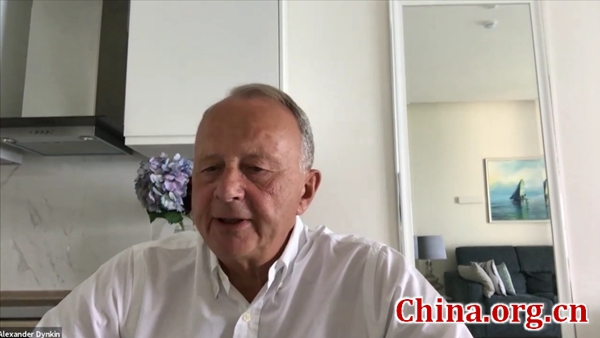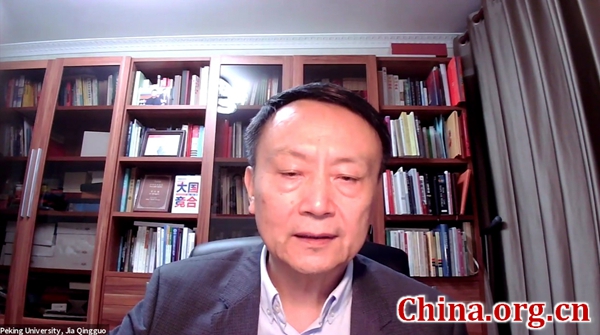Tech decoupling causes wide spillover effects: experts
- By Xu Xiaoxuan
 0 Comment(s)
0 Comment(s) Print
Print E-mail China.org.cn, July 7, 2021
E-mail China.org.cn, July 7, 2021
Given mounting concern over technological decoupling in major countries, experts were brought together to shed light on the impact of this trend on the world order at an online panel of the 9th World Peace Forum (WPF) held at Tsinghua University in Beijing last Saturday.
According to a working paper published by the International Monetary Fund (IMF), technological fragmentation could lead to the loss of about 5% of GDP for many countries.
Kim Sung-Hwan, chairman of East Asia Foundation, South Korea, pointed out that, if technological decoupling occurred between countries, especially China and the U.S., globalization would be slowed, and many other countries would be forced to take side, which would prove "a nightmare" for them.

Alexander A. Dynkin, president of the Primakov Institute of World Economy and International Relations in Russia, noted that looping off technology connections would diminish foreign direct investment (FDI) and thus productivity. Moreover, it could give rise to diverse incompatible standards and make recoupling increasingly costly.
Jia Qingguo, former dean of the School of International Studies at China's Peking University, offered his insights into the reasons for technology decoupling, including the trust deficit among countries regarding high-tech development, such as the fear of 5G penetration affecting privacy, and ideological rendering of technical cooperation.
According to Jia, technology disconnection will bring wide spillover effects, such as increased R&D costs, reduced academic and people-to-people exchanges, and higher trade barriers. In addition, international cooperation to deal with global challenges, like climate change, pandemic control, and non-proliferation of weapons of mass destruction, would become less effective.
Nonetheless, Jia believed that decoupling, which would impose tremendous and basically negative impacts on the world order, was not inevitable. "It's the humans that create history to a large extent. It all depends on our choice," Jia stressed.
"Decoupling and a closed door shouldn't be the option. Only through international cooperation and an open door can we fully reap the benefits of our comparative advantages," Jia concluded.

Organized by Tsinghua university in partnership with the Chinese People's Institute of Foreign Affairs, the WPF is a non-governmental seminar focusing on international security.
With the theme of "International Security Cooperation in the Post-pandemic Era: Upholding and Practicing Multilateralism," this year's forum, attended both online and offline by diplomats, former senior officials and scholars from more than 30 countries, focused on such topics as the Belt and Road Initiative, global economic recovery, global governance and artificial intelligence.






Go to Forum >>0 Comment(s)